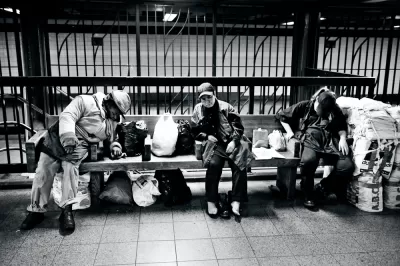The "housing first" approach to homelessness is building a track record of success in Milwaukee.

Brendan O'Brien reports on the success of the Housing First program, launched by Milwaukee County in July 2015 with funding from the city of Milwaukee, the city's housing authority, and the county. "The program has been deemed a success thus far by county officials, who say it has decreased chronic homelessness in the metro area by 70 percent," according to O'Brien. More specifically:
The last point-in-time count, a tally of local homelessness held each January, found the county had 58 chronically homeless individuals in 2016, down from 195 in 2014, the year before the program started, according to the county.
The improving homeless counts echo a similar report of the benefits of the program from December 2015, as shared by Planetizen.
The Housing First program follows a model that achieved success in the state of Utah and has begun to spread to larger cities like Los Angeles (in concept, at least). The "housing first" approach breaks from traditional policies, where "individuals would receive support services to help deal with the cause of their chronic homelessness — such as substance abuse, alcoholism or mental illness — before a home is made available to them."
The Milwaukee County program provides evidence that the housing first model can actually save money for public agencies looking to solve some of the challenges of homelessness. O'Brien explains:
In addition to the social impact the program has had, Housing First is saving taxpayer money, county officials said. The program costs about $25 a day per person, which includes an average of $17.25 in rent and $7.50 for case management services. This compared to the $110 per day that is typically spent on detainment, law enforcement and emergency room services for chronically homeless individuals, several studies have shown, according to county officials.
FULL STORY: County Cuts Homeless Population By 70%

Maui's Vacation Rental Debate Turns Ugly
Verbal attacks, misinformation campaigns and fistfights plague a high-stakes debate to convert thousands of vacation rentals into long-term housing.

Planetizen Federal Action Tracker
A weekly monitor of how Trump’s orders and actions are impacting planners and planning in America.

San Francisco Suspends Traffic Calming Amidst Record Deaths
Citing “a challenging fiscal landscape,” the city will cease the program on the heels of 42 traffic deaths, including 24 pedestrians.

Adaptive Reuse Will Create Housing in a Suburban Texas Strip Mall
A developer is reimagining a strip mall property as a mixed-use complex with housing and retail.

Study: Anti-Homelessness Laws Don’t Work
Research shows that punitive measures that criminalized unhoused people don’t help reduce homelessness.

In U.S., Urban Gondolas Face Uphill Battle
Cities in Latin America and Europe have embraced aerial transitways — AKA gondolas — as sustainable, convenient urban transport, especially in tricky geographies. American cities have yet to catch up.
Urban Design for Planners 1: Software Tools
This six-course series explores essential urban design concepts using open source software and equips planners with the tools they need to participate fully in the urban design process.
Planning for Universal Design
Learn the tools for implementing Universal Design in planning regulations.
Heyer Gruel & Associates PA
JM Goldson LLC
Custer County Colorado
City of Camden Redevelopment Agency
City of Astoria
Transportation Research & Education Center (TREC) at Portland State University
Jefferson Parish Government
Camden Redevelopment Agency
City of Claremont





























